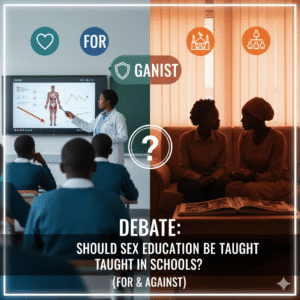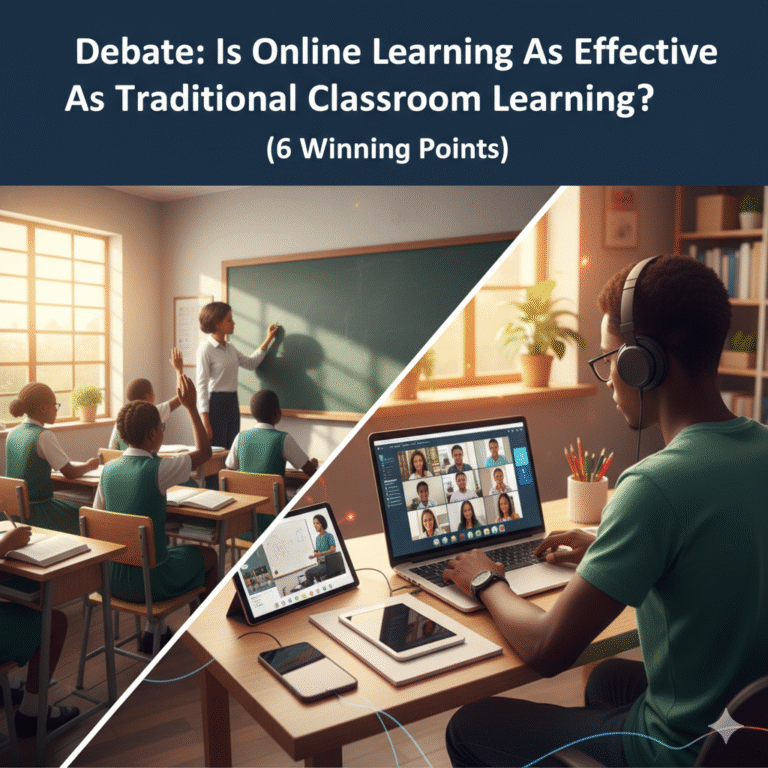Debate: Should Sex Education Be Taught in Schools? (For & Against Arguments)
Debate: Should Sex Education Be Taught in Schools? (For & Against Arguments)
The should sex education be taught in schools debate is one of the most common and controversial topics you can get. It’s tough, and the points are very passionate on both sides.
Because you asked for a complete guide, I am providing the winning points for both the supporting and opposing teams.
Here’s a pro-tip from me: The best debaters I’ve seen don’t just know their own points; they study their opponent’s points just as much. This strategy helps you predict their arguments and prepare a stronger rebuttal.
In this post, you’ll find the copy-and-paste scripts for both sides of the motion.
Disclaimer: This is a template for an educational debate. The arguments for both sides are presented to help students understand all viewpoints. This article is not meant to disrespect any cultural or religious beliefs but to serve as a complete academic resource.
Let’s get to the scripts.

Winning Points SUPPORTING Sex Education in Schools
(If you are arguing FOR the motion, this is your script. Start with Point 1.)
1. It is a Matter of Public Health (Preventing STIs)
Good day, Mr. Chairman, Panel of Judges, and my fellow students.
My first point is simple: This is not a moral issue; it is a public health issue.
We teach students biology. We teach them hygiene. We teach them how to avoid malaria. Why would we hide information about preventing STIs (Sexually Transmitted Infections)?
Giving students factual, scientific information about their health is a basic responsibility of any school. This information saves lives and prevents lifelong diseases. It’s that simple.
2. It Reduces Teenage Pregnancy Rates
My second point is that sex education is the most effective tool we have to reduce teenage pregnancy.
My opponents might claim that talking about it encourages it. The truth is the exact opposite. Ignorance is the real problem.
When students are left in the dark, they get their information from unreliable sources, which leads to mistakes. When students have correct information about their bodies and protection, they make informed decisions.
This isn’t just my opinion. Major global bodies like the [World Health Organization (WHO) have stated that Comprehensive Sexuality Education (CSE)] is a key strategy to reduce teenage pregnancy and improve the health of young people.
3. It Teaches Consent and Body Autonomy
This might be the most important point of all.
Good sex education is not just about the “birds and the bees.” It’s about teaching young men and women the meaning of ‘No.’ It’s about understanding that their body is their own and that they have the right to decide what happens to it.
This is how we fight sexual harassment and abuse. We start by teaching informed consent as a fundamental human right. A school is the perfect place to establish this respectful foundation for all students.
4. It Dispels Dangerous Myths and Misinformation
But here’s the thing: When schools are silent, where do students get their information?
From the internet. From unverified social media. From friends who also don’t know the facts.
This is where dangerous, life-altering myths come from. This is how young people are tricked, hurt, or make terrible health choices. Schools have a duty to correct this. We must be the source of truth, not silence. This is myth-busting at its most critical.
5. Schools Provide a Safe and Structured Environment
My final point is that the school is the safest and most structured place to learn this.
Unlike the internet, which is unfiltered, or parents, who (let’s be honest) many students are too shy to talk to, a school provides a formal, scientific, and age-appropriate setting.
Trained teachers can deliver a planned curriculum that gives students information as they mature. A JSS1 student learns about body changes and hygiene. An SSS3 student learns about consent and responsibility. This structured approach is the best way to ensure every child gets the right information at the right time.
Winning Points OPPOSING Sex Education in Schools
(Okay, time to switch sides. If you are arguing AGAINST the motion, this is your script. Start with Point 1.)
1. It Undermines Our Cultural and Religious Values
Good day, esteemed judges, co-debaters, and my fellow students.
My first point is that this topic is not for a classroom. It is a matter of cultural values and religious beliefs.
Nigeria is a nation built on strong moral foundations. Our traditions and our faiths (both Christianity and Islam) teach that these are private, sensitive, and often sacred subjects.
To bring this topic into a public classroom, alongside mathematics and English, is to cheapen it. It is a direct attack on the beliefs that hold our communities together. We must protect our culture, not dilute it with a curriculum that does not respect our values.
2. This is the Sole Responsibility of Parents
My second point is clear: The primary educators of a child are their parents.
It is the parental responsibility to teach these sensitive topics to their children. Parents can do this at the right time, in the right way, according to their family’s specific faith and values.
The school’s job is to teach academics. It is not their job to overstep and take over the role of the family. This motion is a clear example of school overreach, and we must reject it.
3. It Can Encourage Early Sexual Activity
My opponents will show you studies. But we live in the real world.
When you expose young, impressionable children to these topics, you are not “informing” them; you are “normalizing” the behaviour.
You are planting a seed of curiosity that they are not emotionally mature enough to handle. It can lead to experimentation, peer pressure, and a focus on adult topics long before they are ready. These are moral concerns. This is a door that our schools should not be opening.
4. The Content is Not Age-Appropriate
Finally, who decides what is age-appropriate?
A government curriculum in Abuja cannot understand the maturity level of my child in my local community. A one-size-fits-all program is dangerous.
A JSS1 student does not need to know, and should not be taught, the same things as an SSS3 student. By forcing this curriculum on all schools, we risk exposing young children to information that is damaging, confusing, and completely inappropriate for their age. It is irresponsible.
Conclusion / Summary
As you can see, this is a very complex debate. The “should sex education be taught in schools debate” is not a simple “yes” or “no.”
- The “For” side (Supporting) focuses on public health, scientific facts, student safety, and preventing negative outcomes like STIs and teenage pregnancy.
- The “Against” side (Opposing) champions parental responsibility, the protection of cultural and religious values, and the moral concern that schools are not the right place for such sensitive topics.
Final Disclaimer: This post is for educational purposes only. All arguments are provided to help students build their case for their school debate.
What do you think? Which side has the stronger argument? Drop your opinions in the comments section below!
Also, feel free to share this post with your coursemates or those in your debate team!
Frequently Asked Questions (FAQs)
What’s the difference between “sex education” and “comprehensive sexuality education (CSE)”?
“Sex education” is an older term that often just focused on the biology of reproduction and STIs. “Comprehensive Sexuality Education (CSE)” is the modern term. It is much broader and includes topics like:
- Human rights and consent
- Gender equality and respect
- Relationships and communication
- Body autonomy and self-esteem
- …as well as the science of health and reproduction.
What is the official status of this in Nigeria?
This is a great question for a debater! In Nigeria, the official policy is not “Sex Education” but “Family Life and HIV/AIDS Education” (FLHE). This curriculum was approved by the government. However, its implementation is highly controversial and not uniform across the country, especially in many Northern states, due to strong cultural and religious objections. [UNICEF and other bodies often report on the challenges] of implementing CSE in West Africa, noting the pushback from cultural and religious leaders.
How do I conclude my debate speech?
A great conclusion is to summarize your top 2-3 points and end with a strong, confident statement.
- Example for SUPPORTING: “In conclusion, Honourable Judges, we cannot let fear and myths win. For the sake of our students’ health, for the reduction of teenage pregnancy, and to teach the vital lesson of consent, we must support this motion. Education is always the answer, never ignorance.”
- Example for OPPOSING: “In conclusion, Mr. Chairman, we must ask: whose job is this? It is the job of parents. It is a matter for our faith and our culture, not a school curriculum. To protect our values and our children’s innocence, I urge you to reject this motion.”








One Comment